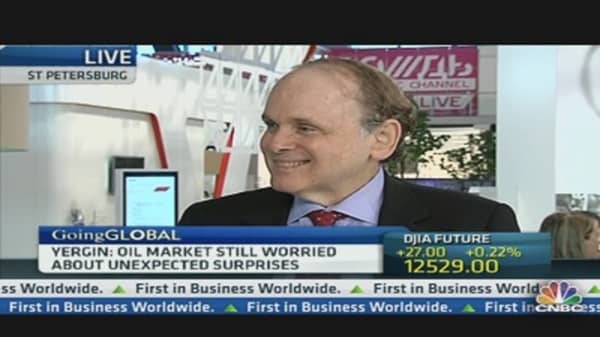Oil fell to its lowest levels in a year and a half on Thursday as a glut in supply and weak demand weighed on prices. But while Brent crude recovered some of those losses on Friday, the outlook for oil remains weak and sanctions imposed on Iran are likely to make matters worse, Dan Yergin, co-founder and chairman of energy research consultancy Cambridge Energy Research Associates (IHS CERA) told CNBC.
Speaking to CNBC from St Petersburg’s International Economic Forum, Yergin said that crude oil prices had dropped sharplybecause of a large build-up of supply and a lack of demand for the commodity, despite the oil security threat from Iran.
“Basically the Iranian security bid is gone from the price…and what’s dominating the market right now is this very large build-up of supply that’s occurred. Partly from Saudi Arabia very consistently putting oil out into the market, a build-up in Iraq and Libya and an astonishing increase in U.S. oil production which is up 25 percent since 2008” he said.
The U.S. believes that Iran is using funds from oil sales to fund its nuclear program and is leading a total of 18 countries that are cutting down or phasing out crude oil contracts from Iran in an attempt to stymie the Iranian oil economy and to force a change of policy. The EU is phasing out contracts by July 1 and similar measures go into force in June in the U.S at the end of June.
“Set all of that against the weak economic situation, weak demand on a global basis, worry about China and Europe and all of that means you have an oil price that is basically showing weakness and shrugging off the sanctions- even though we are only 2 weeks away from [the U.S putting into force] these very powerful sanctions on Iran.”
But Yergin told CNBC that producers would respond to the drop in oil price by cutting back and taking oil off the market. “It doesn’t work overnight, there’s skepticism” he said. “But then eventually it does work.”
He added that what would determine the oil price, as well as other commodity prices (at a time when the CRB Index is at a two-year low) was the uncertainties surrounding Iran and Europe.
“The dominating thing is, on the one hand, does the situation with Iran get more intense? Everyone is worried about the unexpected — what will be the surprise that they haven’t thought of and on the other hand, how weak really is Europe, to the degree that it’s bringing down everything else?” he said.
Though he added that “the unexpected” could come in a different guise, with surprises always being a possibility in the “oil-exporting world”.
“One obvious surprise is if there’s some sort of disruption somewhere else. Two: An accident [in the oil-exporting world] — something that is not intended to happen”, saying that this could be in the form of some sort of potential conflict between Iran and the U.S. due to a breakdown in communication.
“[If] there’s no communication you can get a spiral-there’s no red telephone that connects Tehran and Washington as there was between Moscow and Washington during the Cold War” he said, adding that Iran was not a “unified system” and that “there are different actors that could do different things”.
He warned though, that the potential for military conflict could be present if the tensions between the U.S. and Iran escalate.
“Of courses there was all that discussion about closing the Straits of Hormuz and the response to that was the U.S. military saying “they can close it and we can re-open it. And we can re-open it big-time.”




